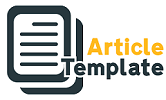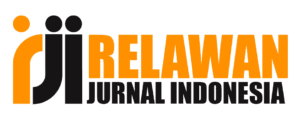The Role of Organizational Climate and Quality of Working Life in Improving Employee Performance
Abstract
This study aims to analyze the role of organizational climate and quality of work life in improving employee performance. A conducive organizational climate and a good quality of work life are believed to create a productive work environment, increase motivation, and strengthen employee commitment to the organization. The method used in this study is a quantitative approach with survey techniques on a number of employees at the Human Resources Development Agency (BPSDM) of South Sulawesi Province. Data analysis was carried out using Partial Least Square Analysis (PLS) is a variant-based structural equation analysis (SEM) that can simultaneously test measurement models as well as structural model tests to test causality relationships between latent variables constructed. The results of the study show that the quality of work life has a significant effect on employee performance, the organizational climate has a significant effect on employee performance. This shows that efforts to improve employee performance should be focused on improving the quality of work life, such as improving work balance and supportive working conditions. These findings indicate the importance of management's efforts in creating a supportive work culture and providing facilities and policies that support work-life balance for employees so that performance can improve.
References
Afandi, P. (2018). Human Resource Management (Theory, Concepts and Indicators). Source: Zanafa Publishing.
Anisah. (2017). Evaluation of Factors Affecting Quality of Work Life. Scientific Journal of Batanghari University of Jambi, Vol.17 No.1, pp. 211-217.
Cascio, W. F. (2014). Managing Human Resources: Productivity, Quality, of Work Life, Profits. New York: McGraw-Hill.
Dewi, D. P., & Harjoyo. (2019). Human Resource Management, Print.First. Banten: UNPAM Press.
Fahmi, I. (2018). Performance Management, Theory and Its Applications. Bandung Alphabet.
Ghozali, I., & Latan, H. (2015). Concepts, techniques, applications using Smart PLS 3.0 for empirical research. BP Undip. Semarang, 290.
Hadari N. (2017). HR Planning for Competitive Profit Organizations. Yogyakarta: UGM Press.
Hasibuan, M. (2016). Human Resource Management. Jakarta: Bumi Aksara Publishers.
Hefni, A. (2022). The Influence of Quality of Working Life on Employee Performance with Job Satisfaction as a Mediation Variable at the Jambi City Regional Personnel and Human Resources Development Agency. Journal of Applied Management and Finance, 11(2), 425- 437.
Simamora, H. (2016), Human Resource Management, Gramedia, Jakarta.
Cashmere. (2016). Human Resource Management (Theory and Practice). Depok: PT. Rajagrafindo Persada.
Mangkunegara, A. P. (2015). Corporate Human Resources. Twelfth print. Teenager Rosdakarya: Bandung.
Mathis, R.L. & J.H. Jackson. 2012. Human Resource Management. Book 1. Switch. Languages: Jimmy Sadeli and Bayu. Jakarta: Salemba Four.
Nadiroh, L. K. A., & Rijanti, T. (2022). The Influence of Quality of Work Life, Work Competence and Knowledge Sharing on Employee Performance. Management Studies and Entrepreneurship Journal (MSEJ), 3(4), 2190- 2199.
Nawawi. (2015), Human Resource Management, Gadjah Mada University, Yogyakarta.
Rampengan, C. B. L., Tewal, B., & Sendow, G. B. (2019). The Influence of Communication, Supervision and Quality of Working Life on the Performance of Employees of Hotel Aryaduta Manado. Emba Journal: Journal of Economics, Management, Business and Accounting Research, 7(3).
Ristanti, A. J., & Dihan, F. N. (2017). The Effect of Quality of Work Life and Job Satisfaction on Employee Performance of Pt Pertamina Persero Ru IV Cilacap. Assets: Journal of Accounting and Education, 5(1), 53-64.
Rivi Zainal, Veithzal. (2015). Human Resource Management for Companies from Theory to Practice, Jakarta: PT Raja Grafindo Persada.
Rivai, V., & Sagala, E. J. (2015). Human Resource Management for Companies. 7th edition. Depok: PT. King Grafindo.
Robbins & Judge (2015). Organizational behavior (16th edition). Jakarta: McGraw Hill and Salemba Empat.
Setiawan, R. A., Prayekti, P., & Septyarini, E. (2023). The Influence of Organizational Climate, Work Engagement and Affective Commitment on Employee Performance. Reslaj: Religion Education Social Laa Roiba Journal, 5(2), 514-525.
Sjahruddin, H., & Anisyar, A. N. (2021). The Effect of Allowances, Incentives and Discipline as Determinants of Employee Performance. JMK (Journal of Management and Entrepreneurship), 6(1), 73-85.
Sugiyono. (2018). Quantitative, Qualitative, and R&D Research Methods. Bandung: Alfabeta.
Suaiba, H. R., Abdullah, J., Suyanto, M. A., & Karundeng, D. R. (2021). The Influence of Organizational Culture, Motivation and Work Environment on Employee Performance at Bank Indonesia Representative Office in Gorontalo Province. MEA (Management, Economics, & Accounting) Scientific Journal, 5(3), 1545-1568.
Susilo, M. A., Jufrizen, J., & Khair, H. (2023). The Influence of Organizational Climate and Motivation on Employee Performance through Organizational Citizenship Behavior. Jesya (Journal of Sharia Economics), 6(1), 587-605.
Syaifudin, N. (2021). The influence of organizational climate and culture on employee innovation within the Legal Bureau of the Ministry of Finance. Coopetition: Scientific Journal of Management, 12(2), 233-244.
Scarlet House. (2017). Research Methods for Business. Jakarta: Salemba Four.
Woru, D., Erari, A., & Rumanta, M. (2021). Employee Performance Is Influenced by Communication, Organizational Climate and Work Motivation. Alignment: Journal of Administration and Educational Management, 4(1), 8-20.










